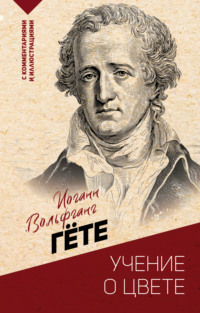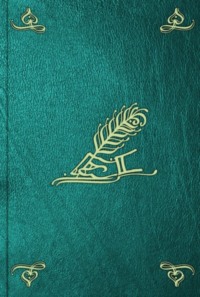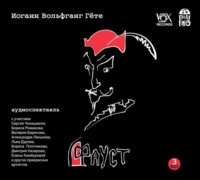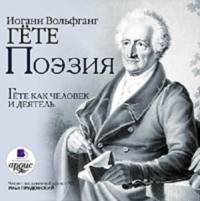 полная версия
полная версияThe Autobiography of Goethe
My father was particularly pertinacious on this point of completeness. What was once undertaken must be finished, even if the inconvenience, tedium, vexation, nay, uselessness of the thing begun were plainly manifested in the meantime. It seemed as if he regarded completeness as the only end, and perseverance as the only virtue. If in our family circle, in the long winter evenings, we had begun to read a book aloud, we were compelled to finish, though we were all in despair about it, and my father himself was the first to yawn. I still remember such a winter when we had thus to work our way through Bower's History of the Popes. It was a terrible time, as little or nothing that occurs in ecclesiastical affairs can interest children and young people. Still, with all my inattention and repugnance, so much of that reading remained in my mind that I was able, in after times, to take up many threads of the narrative.
Lessons in Fencing.
Amid all these heterogeneous occupations and labours, which followed each other so rapidly that one could hardly reflect whether they were permissible and useful, my father did not lose sight of the main object. He endeavoured to direct my memory and my talent for apprehending and combining to objects of jurisprudence, and therefore gave me a small book by Hopp, in the shape of a catechism, and worked up according to the form and substance of the Institutions. I soon learned questions and answers by heart, and could represent the catechist as well as the catechumen; and, as in religious instruction at that time, one of the chief exercises was to find passages in the Bible as readily as possible, so here a similar acquaintance with the Corpus Juris was found necessary, in which, also, I soon became completely versed. My father wished me to go on, and the little Struve was taken in hand; but here affairs did not proceed so rapidly. The form of the work was not so favourable for beginners, that they could help themselves on, nor was my father's method of illustration so liberal as greatly to interest me.
Not only by the warlike state in which we lived for some years, but also by civil life itself, and the perusal of history and romances, was it made clear to me that there were many cases in which the laws are silent and give no help to the individual, who must then see how to get out of the difficulty by himself. We had now reached the period when, according to the old routine, we were, besides other things, to learn to fence and ride, that we might guard our skins upon occasion, and have no pedantic appearance on horseback. As to the first, the practice was very agreeable to us; for we had already, long ago, contrived to make broad-swords out of hazel-sticks, with basket-hilts, neatly woven of willow, to protect the hands. Now we might get real steel blades, and the clash we made with them was very merry.
There were two fencing-masters in the city: an old earnest German, who went to work in a severe and solid style, and a Frenchman, who sought to gain his advantage by advancing and retreating, and by light fugitive thrusts, which he always accompanied by cries. Opinions varied as to whose manner was the best. The little company with which I was to take lessons sided with the Frenchman, and we speedily accustomed ourselves to move backwards and forwards, make passes and recover, always breaking out into the usual exclamations. But several of our acquaintance bad gone to the German teacher, and practised precisely the opposite. These distinct modes of treating so important an exercise, the conviction of each that his master was the best, really caused a dissension among the young people, who were of about the same age, and the fencing-schools occasioned serious battles, – for there was almost as much fighting with words as with swords; and to decide the matter in the end, a trial of skill between the two teachers was arranged, the consequences of which I need not circumstantially describe. The German stood in his position like a wall, watched his opportunity, and contrived to disarm his opponent over and over again with his cut and thrust. The latter maintained that this mattered not, and proceeded to exhaust the other's wind by his agility. He fetched the German several lunges, too, which, however, if they had been in earnest, would have sent himself into the next world.
On the whole, nothing was decided or improved, except that some went over to our countryman, of whom I was one. But I had already acquired too much from the first master; and hence a considerable time elapsed before the new one could break me of it, who was altogether less satisfied with us renegades than with his original pupils.
As to riding, it fared still worse with me. It happened that they sent me to the course in the autumn, so that I commenced in the cool and damp season. The pedantic treatment of this noble art was highly repugnant to me. From first to last the whole talk was about sitting the horse, and yet no one could say in what a proper sitting consisted, though all depended on that; for they went to and fro on the horse-without stirrups. Moreover, the instruction seemed contrived only for cheating and degrading the scholars. If one forgot to hook or loosen the curb-chain, or let his switch fall down, or even his hat, – every delay, every misfortune, had to be atoned for by money, and one was even laughed at besides. This put me in the worst of humours, particularly when I found the place of exercise itself quite intolerable. The great nasty space, either wet or dusty, the cold, the mouldy smell, all together was in the highest degree repugnant to me; and since the stable-master always gave the others the best and me the worst horses to ride, perhaps because they bribed him by breakfasts and other gifts, or even by their own cleverness; since he kept me waiting, and, as it seemed, slighted me, I spent the most disagreeable hours in an employment that ought to have been the most pleasant in the world. Nay, the impression of that time and of these circumstances has remained with me so vividly, that although I afterwards became a passionate and daring rider, and for days and weeks together scarcely got off my horse, I carefully shunned covered riding-courses, and at least passed only a few moments in them. The case often happens that when the elements of an exclusive art are taught us, this is done in a painful and revolting manner. The conviction that this is both wearisome and injurious, has given rise in later times to the educational maxim, that the young must be taught everything in an easy, cheerful, and agreeable way: from which, however, other evils and disadvantages have proceeded.
With the approach of spring, times became again more quiet with us, and if in earlier days I had endeavoured to obtain a sight of the city, its ecclesiastical, civil, public and private structures, and especially found great delight in the still prevailing antiquities, I afterwards endeavoured, by means of Lersner's Chronicle, and other Frankfortian books and pamphlets belonging to my father, to revive the persons of past times. This seemed to me to be well attained by great attention to the peculiarities of times and manners, and of distinguished individuals.
The Rebel Fettmilch.
Among the ancient remains, that which, from my childhood, had been remarkable to me, was the skull of a state criminal, fastened up on the tower of the bridge, who, out of three or four, as the naked iron spikes showed, had, since 1616, been preserved in spite of the encroachments of time and weather. Whenever one returned from Sachsenhausen to Frankfort, one had this tower before one, and the skull was directly in view. As a boy, I liked to hear related the history of these rebels – Fettmilch and his confederates – how they had become dissatisfied with the government of the city, had risen up against it, plotted a mutiny, plundered the Jews' quarter, and excited a fearful riot, but were at last captured, and condemned to death by a deputy of the emperor. Afterwards I felt anxious to know the most minute circumstance, and to hear what sort of people they were. When from an old contemporary book, ornamented with woodcuts, I learned that while these men had indeed been condemned to death, many councillors had at the same time been deposed, because various kinds of disorder and very much that was unwarrantable was then going on; when I heard the nearer particulars now all took place, I pitied the unfortunate persons who might be regarded as sacrifices made for a future better constitution. For from that time was dated the regulation which allows the noble old house of Limpurg, the Frauenstein-house, sprung from a club, besides lawyers, tradespeople, and artisans, to take a part in a government, which, completed by a system of ballot, complicated in the Venetian fashion, and restricted by the civil colleges, was called to do right, without acquiring any special privilege to do wrong.
Among the things which excited the misgivings of the Boy, and even of the youth, was especially the state of the Jewish quarter of the city (Judenstadt), properly called the Jew-street (Judengasse), as it consisted of little more than a single street, which in early times may have been hemmed in between the walls and trenches of the town, as in a prison (Zwinger.) The closeness, the filth, the crowd, the accent of an unpleasant language, altogether made a most disagreeable impression, even if one only looked in as one passed the gate. It was long before I ventured in alone, and I did not return there readily, when I had once escaped the importunities of so many men unwearied in demanding and offering to traffic. At the same time the old legends of the cruelty of the Jews towards Christian children, which we had seen hideously illustrated in Gottfried's Chronicle, hovered gloomily before my young mind. And although they were thought better of in modern times, the large caricature, still to be seen, to their disgrace, on an arched wall under the bridge tower, bore extraordinary witness against them; for it had been made, not through private ill-will, but by public order.
However, they still remained, nevertheless, the chosen people of God, and passed, no matter how it came about, as a memorial of the most ancient times. Besides, they also were men, active and obliging, and even to the tenacity with which they clung to their peculiar customs, one could not refuse one's respect. The girls, moreover, were pretty, and were far from displeased when a Christian lad, meeting them on the sabbath in the Fischerfeld, showed himself kindly and attentive. I was consequently extremely curious to become acquainted with their ceremonies. I did not desist until I had frequently visited their school, had assisted at a circumcision and a wedding, and had formed a notion of the Feast of the Tabernacles. Everywhere I was well received, pleasantly entertained, and invited to come again; for they were persons of influence by whom I had been either introduced or recommended.
Public Burning of a Book.
Thus, as a young resident in a large city, I was thrown about from one object to another, and horrible scenes were not wanting in the midst of the municipal quiet and security. Sometimes a more or less remote fire aroused us from our domestic peace, sometimes the discovery of a great crime, with its investigation and punishment, set the whole city in an uproar for many weeks. We were forced to be witnesses of different executions; and it is worth remembering, that I was also once present at the burning of a book. The publication was a French comic romance, which indeed spared the state, but not religion and manners. There was really something dreadful in seeing punishment inflicted on a lifeless thing. The packages burst asunder in the fire, and were raked apart by an oven-fork, to be brought in closer contact with the flames. It was not long before the kindled sheets were wafted about in the air, and the crowd caught at them with eagerness. Nor could we rest until we had hunted up a copy, while not a few managed likewise to procure the forbidden pleasure. Nay, if it had been done to give the author publicity, he could not himself have made a more effectual provision.
But there were also more peaceable inducements which took me about in every part of the city. My father had early accustomed me to manage for him his little affairs of business. He charged me particularly to stir up the labourers whom he set to work, as they commonly kept him waiting longer than was proper; because he wished everything done accurately, and was used in the end to lower the price for a prompt payment. In this way, I gained access to all the workshops; and as it was natural to me to enter into the condition of others, to feel every species of human existence, and sympathize in it with pleasure, these commissions were to me the occasion of many most delightful hours, and I learned to know every one's method of proceeding, and what joy and sorrow, what advantages and hardships, were incident to the indispensable conditions of this or that mode of life. I was thus brought nearer to that active class which connects the lower and upper classes. For, if on the one side stand those who are employed in the simple and rude products, and on the other those who desire to enjoy something that has been already worked up; the manufacturer, with his skill and hand, is the mediator through whom the other two receive something from each other; each is enabled to gratify his wishes in his own way. The household economy of many crafts, which took its form and colour from the occupation, was likewise an object of my quiet attention; and thus was developed and strengthened in me the feeling of the equality, if not of all men, yet of all human conditions, – the mere fact of existence seeming to me the main point, and all the rest indifferent and accidental.
As my father did not readily allow himself an expense which would be at once consumed in a momentary enjoyment – as I can scarcely call to mind that we ever took a walk together, and spent anything in a place of amusement, – he was, on the other hand, not niggardly in procuring such things as had a good external appearance in addition to inward value. No one could desire peace more than he, although he had not felt the smallest inconvenience during the last days of the war. With this feeling, he had promised my mother a gold snuffbox, set with diamonds, which she was to receive as soon as peace should be publicly declared. In the expectation of the happy event, they had laboured now for some years on this present. The box, which was tolerably large, had been executed in Hanau, for my father was on good terms with the gold-workers there, as well as with the heads of the silk establishments. Many designs were made for it; the cover was adorned by a basket of flowers, over which hovered a dove with the olive-branch. A vacant space was left for the jewels, which were to be set partly in the dove and partly on the spot where the box is usually opened. The jeweller to whom the execution and the requisite stones were entrusted was named Lautensak, and was a brisk, skilful man, who like many artists, seldom did what was necessary, but usually works of caprice, which gave him pleasure. The jewels were very soon set, in the shape in which they were to be put upon the box, on some black wax, and looked very well; but they would not come off to be transferred to the gold. In the outset, my father let the matter rest; but as the hope of peace became livelier, and finally when the stipulations – particularly the elevation of the Archduke Joseph to the Roman throne – seemed more precisely known, he grew more and more impatient, and I had to go several times a week, nay, at last, almost daily, to visit the tardy artist. By means of my unremitted teazing and exhortation, the work went on, though slowly enough; for as it was of that kind which can be taken in hand or laid aside at will, there was always something by which it was thrust out of the way, and put aside.
Lautensak's Bouquet.
The chief cause of this conduct, however, was a task which the artist had undertaken on his own account. Everybody knew that the Emperor Francis cherished a strong liking for jewels, and especially for coloured stones. Lautensak had expended a considerable sum, and as it afterwards turned out larger than his means, on such gems, out of which he had begun to shape a nosegay, in which every stone was to be tastefully disposed, according to its shape and colour, and the whole form a work of art worthy to stand in the treasure-vaults of an emperor. He had, in his desultory way, laboured for many years upon it, and now hastened – because after the hoped-for peace the arrival of the Emperor, for the coronation of his son, was expected in Frankfort – to complete it and finally to put it together. My desire to become acquainted with such things he used very dexterously in order to distract me as a bearer of threats, and to lead me away from my intention. He strove to impart a knowledge of these stones to me, and made me attentive to their properties and value, so in that in the end I knew his whole bouquet by heart, and quite as well as he could have demonstrated its virtues to a customer. It is even now before me, and I have since seen more costly, but not more graceful specimens of show and magnificence in this sort. He possessed, moreover, a pretty collection of engravings, and other works of art, with which he liked to amuse himself; and I passed many hours with him, not without profit. Finally, when the Congress of Hubertsburg was finally fixed, he did for my sake more than was due; and the dove and flowers actually reached my mother's hands on the festival in celebration of the peace.
I then received also many similar commissions to urge on painters with respect to pictures which had been ordered. My father had confirmed himself in the notion – and few men were free from it – that a picture painted on wood was greatly to be preferred to one that was merely put on canvas. It was therefore his great care to possess good oak boards, of every shape, because he well knew that just on this important point the more careless artists trusted to the joiners. The oldest planks were hunted up, the joiners were obliged to go accurately to work with gluing, painting, and arranging, and they were then kept for years in an upper room, where they could be sufficiently dried. A precious board of this kind was intrusted to the painter Junker, who was to represent on it an ornamental flower-pot, with the most important flowers drawn after nature in his artistic and elegant manner. It was just about the spring-time, and I did not fail to take him several times a week the most beautiful flowers that fell in my way, which he immediately put in, and by degrees composed the whole out of these elements with the utmost care and fidelity. On one occasion I had caught a mouse, which I took to him, and which he desired to copy as a very pretty animal; nay, really represented it, as accurately as possible, gnawing an ear of corn at the foot of the flower-pot. Many such inoffensive natural objects, such as butterflies and chafers, were brought in and represented, so that finally, as far as imitation and execution were concerned, a highly valuable picture was put together.
Hence I was not a little astonished when the good man formally declared one day, when the work was just about to be delivered, that the picture no longer pleased him, – since, while it had turned out quite well in its details, it was not well composed as a whole, because it had been produced in this gradual manner; and he had perpetrated a blunder in the outset, in not at least devising a general plan for light and shade, as well as for colour, according to which the single flowers might have been arranged. He examined with me the minutest parts of the picture, which had arisen before my eyes during a half year, and had in many respects pleased me, and managed to convince me perfectly, much to my regret. Even the copy of the mouse he regarded as a mistake; for many persons, he said, have a sort of horror of such animals, and they should not be introduced where the object is to excite pleasure. As it commonly happens with those who are cured of a prejudice, and imagine themselves much more knowing than they were before, I now had a real contempt for this work of art, and agreed perfectly with the artist when he caused to be prepared another tablet of the same size, on which, according to his taste, he painted a better formed vessel and a more artistically arranged nosegay, and also managed to select and distribute the little living accessories in an ornamental and agreeable way. This tablet also he painted with the greatest care, though altogether after the former copied one, or from memory, which, through a very long and assiduous practice, came to his aid. Both paintings were now ready, and we were thoroughly delighted with the last, which was certainly the more artistic and striking of the two. My father was surprised with two pictures instead of one, and to him the choice was left. He approved of our opinion, and of the reasons for it, and especially of our good-will and activity; but, after considering both pictures some days, decided in favour of the first, without saying much about the motives of his choice. The artist, in an ill-humour, took back his second well-meant picture, and could not refrain from the remark that the good oaken tablet on which the first was painted had certainly its effect on my father's decision.
Oil-Cloth Factory.
Now I am again speaking of painting, I am reminded of a large establishment, where I passed much time, because both it and its managers especially attracted me. It was the great oil-cloth factory which the painter NOTHNAGEL had erected; an expert artist, but one who by his mode of thought inclined more to manufacture than to art. In a very large space of courts and gardens, all sorts of oil-cloths were made, from the coarsest that are spread with a trowel, and used for baggage-wagons and similar purposes, and the carpets impressed with figures, to the finer and the finest, on which sometimes Chinese and grotesque, sometimes natural flowers, sometimes figures, sometimes landscapes were represented by the pencils of accomplished workmen. This multiplicity, to which there was no end, amused me vastly. The occupation of so many men, from the commonest labour to that in which a certain artistic worth could not be denied, was to me extremely attractive. I made the acquaintance of this multitude of younger and older men, working in several rooms one behind the other, and occasionally lent a hand myself. The sale of these commodities was extraordinarily brisk. Whoever at that time was building or furnishing a house, wished to provide for his lifetime, and this oil-cloth carpeting was certainly quite indestructible. Nothnagel had enough to do in managing the whole, and sat in his office surrounded by factors and clerks. The remainder of his time he employed in his collection of works of art, consisting chiefly of engravings, in which, as well as in the pictures he possessed, he traded occasionally. At the same time he had acquired a taste for etching; he etched a variety of plates, and prosecuted this branch of art even into his latest years.
As his dwelling lay near the Eschenheim gate, my way when I had visited him led me out of the city to some pieces of ground which my father owned beyond the gates. One was a large orchard, the soil of which was used as a meadow, and in which my father carefully attended the transplanting of trees, and whatever else pertained to their preservation, though the ground itself was leased. Still more occupation was furnished by a very well-preserved vineyard beyond the Friedberg gate, where between the rows of vines, rows of asparagus were planted and tended with great care. Scarcely a day passed in the fine season in which my father did not go there, and as on these occasions we might generally accompany him, we were provided with joy and delight from the earliest productions of spring to the last of autumn. We also learned to occupy ourselves with gardening matters, which, as they were repeated every year, became in the end perfectly known and familiar to us. But after the manifold fruits of summer and autumn, the vintage at last was the most lively and the most desirable: nay, there is no question that as wine gives a freer character to the very places and districts where it is grown and drunk, so also do these vintage-days, while they close summer and at the same time open the winter, diffuse an incredible cheerfulness. Joy and jubilation pervade a whole district. In the daytime, huzzas and shoutings are heard from every end and corner, and at night rockets and fire-balls, now here, now there, announce that the people, everywhere awake and lively, would willingly make this festival last as long as possible. The subsequent labour at the wine-press, and during the fermentation in the cellar, gave us also a cheerful employment at home, and thus we ordinarily reached winter without being properly aware of it.









